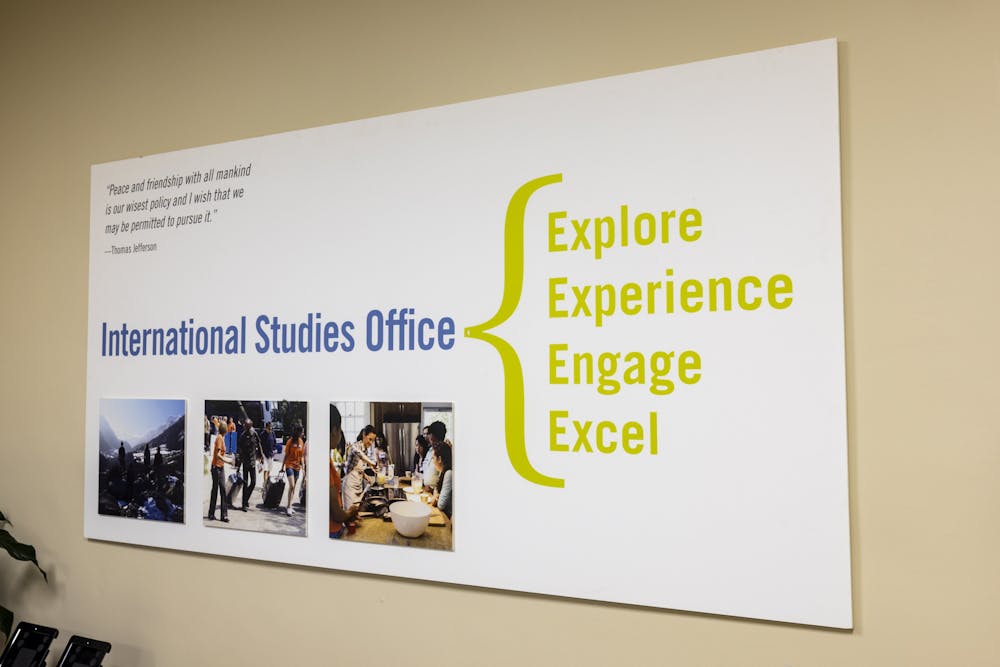According to the International Studies Office, study abroad is essential in “preparing students for the challenges of the global world.” Given its importance, study abroad should be easily accessible to all students. In reality, however, study abroad is less than accessible when students wish to transfer study abroad credits to count toward their major or minor at the University — something which must happen for all non-University study abroad programs. The ISO has delegated the responsibility of providing study abroad information and approving study abroad transfer credits for majors to individual departments. In and of itself, this is not a bad idea. In fact, this conscientiously accommodates the differing curriculums and academic pedagogies of each department. In practice, this decentralized decision-making process results in an ad hoc system that can be unnecessarily prohibitive to students who wish to have a formative study abroad experience and complete their major.
One very clear instance of the decentralized system is that different majors allow students to count different, often concerningly low, numbers of transfer study abroad credits towards their major. Generally speaking, foreign language departments at the University allow a larger number of credits to be transferred than any other majors — the French department allows 12 credits of study abroad credit while the anthropology and environmental science department only allow six credits, which is the equivalent of two classes. Herein, we witness the perpetuation of a general and problematic assumption that foreign languages are the only discipline that genuinely benefit from study abroad. STEM disciplines have traditionally distanced themselves from study abroad. This is a dangerous trend that disregards the global interconnectedness of all fields and the holistic benefits of study abroad. While language departments have a unique relationship with study abroad due to the language immersion these programs foster, many benefits of studying abroad are unrelated to language and instead teach skills necessary to thrive in the workplace and to become a global citizen — skills such as improved problem solving and communication, expanded cultural awareness and increased flexibility.
Often these departments that permit only minimal amounts of study abroad transfer credit employ homogenizing language that lumps domestic and study abroad transfer credit together when they specify major and minor requirements. For example, the anthropology department allows for six credits to be used from outside the department — this can be from domestic transfer credit, study abroad credit or credits from other University departments. Similarly, the politics department, even for the evidently global-minded foreign affairs concentration, only permits six credits of domestic or study abroad transfer politics credit. This minimal amount of credit is laughable — especially for disciplines such as anthropology and politics whose historical ignorance of global cultures enabled past evils such as colonialism. The failure to carve out unique space within major and minor requirements for students who wish to study abroad highlights how departments across the University diminish the importance of studying abroad and discourage students from pursuing these illuminating and broadening experiences.
Additionally, some departments have ridiculously stringent application processes through which students must be approved by the department’s Director of Undergraduate Programs to receive credit. The economics department, for example, not only requires a syllabus of the class, but they also require that the professor of the class abroad provide their CV and have received a doctorate in economics — all of which must be provided for approval before the student leaves for study abroad. A syllabus is a fairly reasonable and straightforward request. The requirement of a professor’s CV is absurd, however, because it implies that the economics department at the University should be the global arbitrator of who is qualified to teach economics. This is short-sighted. While one could argue that the University’s economics department has a vested and legitimate interest in arbitrating which professors’ classes can count towards a degree from this University, that concern may be entirely overshadowed by the simple fact that some classes necessitate a global perspective. It is not hard to imagine that it might be more beneficial to take ECON 3650, “Economics of India,” in India irrespective of the caliber of the professor. Clearly, the application process for credit approval in some departments problematically reduces the educational study abroad experience to the classroom and requires an unreasonable amount of documentation.
Not only is transferring study abroad credit unduly difficult, study abroad information can also be exceptionally hard to locate — some departments do not have specific pages dedicated to providing study abroad information. For example, the biology department has no page on study abroad. Even outwardly global departments such as religious studies do not have pages dedicated to study abroad. Not only do dedicated study abroad pages delineate important information regarding study abroad as it relates to specific majors, they also communicate the value of study abroad. Instead of being given its own space, this information is often woven in as an afterthought to other major requirement information. This makes study abroad appear to be an afterthought and as somehow superfluous to inculcating the academic and critical thinking skills reflective of the major or minor.
Luckily for the International Studies Office and for students, the current barriers that exist for transferring study abroad credit are easily remedied. ISO can continue with the decentralized system in which individual departments are make final decisions regarding transfer credit — however, basic standards must be set for each department. Firstly, there must be a dedicated page to provide subject-specific study abroad information. Secondly, departments must allow at least nine major credits to come specifically from study abroad credit — a compromise between the six credits currently allowed by non-language departments and the twelve credits allowed by many language departments. And thirdly, ISO must standardize the study abroad transfer credit application process so that all departments request the same documentation — for goodness’ sake, let this just be a syllabus.
Naima Sawaya is a Senior Associate Opinion Editor for The Cavalier Daily. She can be reached at opinion@cavalierdaily.com.







